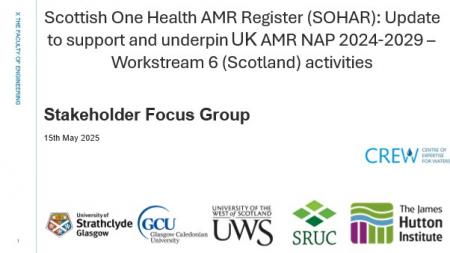News
Understanding Scotland’s Role in Tackling Antimicrobial Resistance

A Changing AMR Landscape
A recent CREW stakeholder workshop brought together researchers, policymakers, industry experts, regulators and other environmental professionals to explore how Scotland is contributing to the fight against antimicrobial resistance (AMR). This workshop marked a key stage in the ongoing CREW project which builds on the findings from an earlier CREW project and involves updating the previously developed Scottish One-Health Antimicrobial Resistance Register (SOHAR) database. The SOHAR project team is led by Professor Fiona Henriquez-Mui at the University of Strathclyde but also involves leading academics in the area from Glasgow Caledonian, UWS, SRUC and JHI and is supported by the Scottish Government, SEPA and CREW. Furthermore, this project supports the UK’s AMR National Action Plan (2024–2029).
So far, the project team has carried out a rapid review of publicly available research and project data related to AMR. They’ve identified over 650 relevant publications and 250 projects with links to Scotland so far, covering a wide range of topics, from clinical AMR and antimicrobial stewardship to environmental transmission and emerging innovations. The refreshed register will feature new categories such as biosecurity, AI tools, and risk management, reflecting the evolving landscape of AMR research and helping inform decision-making across sectors.
Breakout Session 1 – AMR Community in Action
The first breakout discussion revealed the breadth of activity underway, from community pharmacy and hospital stewardship to environmental monitoring, climate-related risks, and agricultural practices. Participants also highlighted growing areas of focus such as aquaculture, biosensor innovation, and public awareness. A strong theme throughout was the importance of behaviour change, whether in prescribing, farming, or public engagement. The workshop showed just how interconnected AMR is across sectors, reinforcing the need for a One Health approach.
Breakout Session 2 – Shaping SOHAR
In the second breakout session, participants discussed how to improve the Scottish One Health AMR Register to ensure it is as useful and accessible as possible. Suggestions included adding more detailed metadata, such as sample locations, methods, and organisms studied, as well as clearer links to policy relevance and potential impacts. Others highlighted the importance of supporting collaboration across disciplines, sectors, and institutions, especially where AMR research overlaps with environmental monitoring, public health, and clinical care. There was also strong interest in using the register to support better communication, both among researchers and with the public, and in exploring partnerships with agencies to address overlooked risks such as tourist waste. These discussions reinforced the value of the register not just as a repository of information, but as a tool for shaping future research, policy, and public engagement.
Looking Ahead: From Evidence to Action
As the workshop drew to a close, there was a shared sense of energy and enthusiasm. Participants emphasised the importance of using this resource to drive behaviour change, improve public communication, and support practical decision-making across sectors. Ideas ranged from including a directory of stakeholders to highlighting links between AMR and wider health and sustainability issues, such as housing and the UN Sustainable Development Goals. With over 670 publications and 200 projects mapped to national priorities, the next phase will focus on finalising the database, producing a policy brief and a plain English summary which will all be available on the CREW publication page on completion. By turning data into action, this work aims to help shape Scotland’s response to antimicrobial resistance for years to come.
CREW would like to thank the research team (University of Strathclyde, Glasgow Caledonian, University of the West of Scotland, SRUC and JHI) and the Project Steering Group (SEPA and Scottish Government) for their dedication and support to the project and in addressing this important issue.




